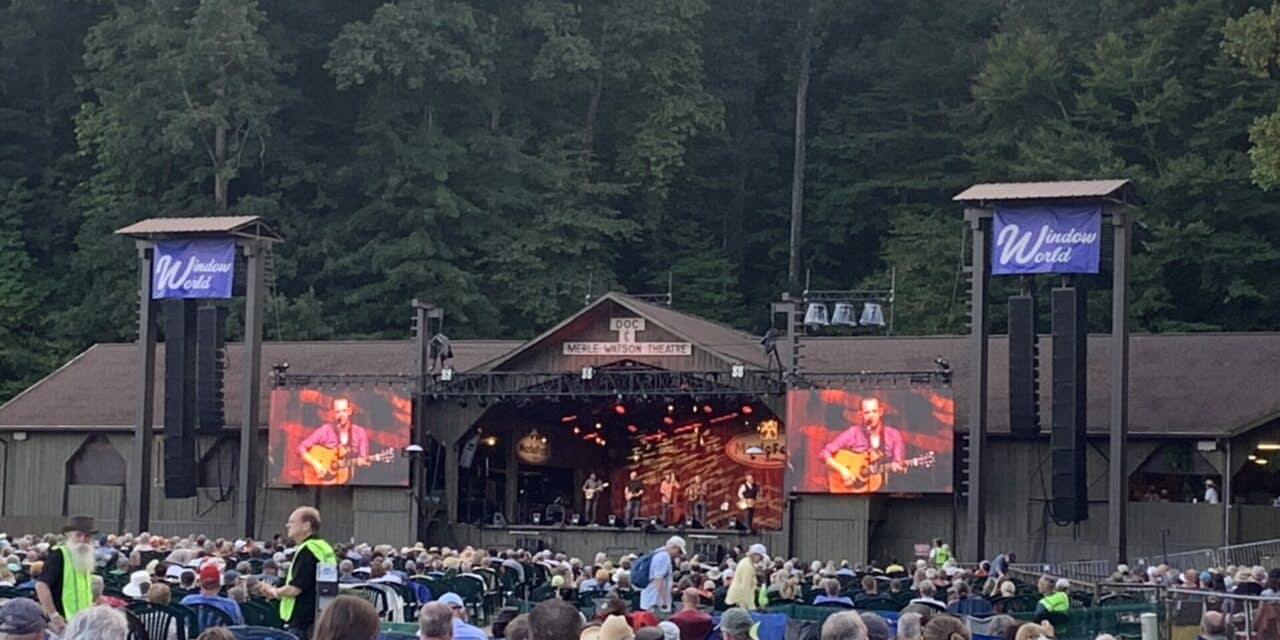ALL THE WORLD’S A STAGE: The Doc & Merle Watson Stage, shown during MerleFest in 2021, is the headliners’ performance space at Wilkes Community College. (Don Muret/Staff)
Family vibe permeates longtime music fest
MerleFest, the “traditional plus” heartbeat of roots music, celebrates its 35th anniversary and the 100th anniversary of founder Doc Watson’s birthday today through Sunday in Wilkesboro, North Carolina.
The festival attracts up to 80,000 music enthusiasts to Wilkes Community College, which has held the event since its start in 1988 to fund a sensory campus garden for the blind. Wilkesboro has a population of 3,687 and the college, which serves 10,000 students from the surrounding area, will hopefully top $20 million in total funding from the event this year.
“That’s a lot of bake sales and car washes if you think about your typical fundraiser,” chuckled Dr. Jeff Cox, president of Wilkes Community College. “I’m not aware of another community college or even university who does any kind of music festival at this scale as a fundraiser. We are unique in that regard; that kind of revenue is unprecedented to generate.”
Squeezed into the college calendar a few weeks before graduation, MerleFest is the unofficial kickoff to roots festival season and a homecoming for fans and artists that make the annual trip to the quaint, historic town in the foothills of the Blue Ridge Mountains. Folks come from 48 states and a dozen other countries.
“This is the introduction to the musical season,” said Cox, who has been president of the college for about nine years. “Historically, this has been the first big event and it’s a homecoming for a lot of these musicians who travel in the same circles. This is the kick-start to their year.”
Even though he was born and raised in the region, Cox admits he had a false impression about MerleFest.
“I, like many other people, had the misconception that this was just a simple bluegrass festival and I had never (attended) until I was named president,” he said. “I had no idea of the breadth and depth. It is so much more than a bluegrass festival. It’s Americana, folk, rock ‘n’ roll, country, jazz. Doc Watson said it was ‘Traditional Plus.’ The plus was anything else that he liked and he liked just about everything else.”
One-hundred artists perform on 12 themed stages spread out across the sprawling 150-acre campus. Each stage has a specific identity from Little Pickers, which is a platform for developing young talent, to the main Doc and Merle Watson Stage for nightly closers. This year’s headliners include “Brothers of a Feather” with Chris and Rich Robinson of the Black Crowes; The Avett Brothers; Marcus King; Maren Morris; Tanya Tucker; Little Feat; and Nickel Creek.
The B. Townes Americana stage presents genre favorites, while other stages include the Traditional stage, a Dance stage with upbeat music and occasional callers, the music discovery-focused Hillside stage and a Creekside stage, which is sponsored by the North Carolina Department of Cultural Resources, featuring in-state performers.
The great thing about MerleFest is most of the acts perform multiple times across the different stages, so if spectators miss an artist, they have the opportunity to catch them later in the day.
The great thing about MerleFest is most of the acts perform multiple times across the different stages, so if spectators miss an artist, they have the opportunity to catch them later in the day.
“We have a system in place for years now of how everything works and a general idea of what works best on what stages,” explained Lindsay Craven, MerleFest artist relations manager. “It depends where you are what kind of sound you are going to find.”
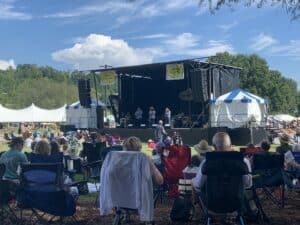
MULTI-FACETED: MerleFest’s dozen stages provide opportunities to see as many artists as possible. (Don Muret/Staff)
Alison Brown, the first woman to win an International Bluegrass Music Award in an instrument category and the first female five-string banjo player to be inducted into the American Banjo Hall of Fame, performs twice on Friday at the indoor Walker Center (12:45 pm) and the Hillside Stage (2:45 p.m). Brown then signs autographs at 4 p.m.
MerleFest “is very deeply connected to the roots music community and it’s one of the largest tastemaker festivals in the United States,” Brown said. “For me personally, because I loved Doc Watson so much, even though Doc isn’t with us anymore, his spirit still resonates through the festival.”
Brown was a player with Alison Krauss and Union Station when she attended the second festival in 1989. The stage was a flatbed trailer set up on a softball field and he recalled getting a credential that referred to the artists as “Kin.”
Brown, who has a new album On Banjo coming out May 5 via Compass Records, said that what sets MerleFest apart is “the legacy, that connection to Doc Watson, that connection to somebody who had the music passed down to him in the early 1900s. So, it really makes all of us realize our ties to something bigger with more longevity than any one of us individually.”
The caliber of musicianship reflects the music community’s reverence for Watson, who has been described as one of the most influential figures in modern music. The North Carolina native was a key figure in the folk revival during the 1960s. He received the National Medal of Arts from President Bill Clinton in 1997, was a seven-time Grammy winner and Grammy Lifetime Achievement Award recipient.
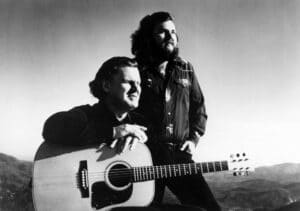
FOUNDING FATHER: Doc Watson, seated, started MerleFest to honor his son, Eddy Merle Watson, shown standing next to him. Merle died at age 36. (Getty Images)
CIRCA 1975: Bluegrass musicians Doc Watson and his son Merle Watson pose for a portrait in circa 1975. (Photo by Michael Ochs Archives/Getty Images)
Watson’s influence spans genres and generations, especially among guitar players, for his pioneering flatpicking style. He was also a master of the banjo and the subject of books, boxed sets and compilation albums. The latest star-packed collection, I Am A Pilgrim: Doc Watson at 100, is being released Friday to coincide with the festival he helped create in honor of his son and gifted sideman, Eddy Merle Watson who died in a tractor accident in 1985. Watson, who went blind at a young age, died in 2012.
Several roots music stalwarts have supported the festival since the beginning and are making appearances in 2023 in honor of Watson and his son, including Jerry Douglas, Sam Bush, Jim Lauderdale and T. Michael Coleman, who toured with Doc and Merle Watson. There are workshops, speakers, band competitions and a screening of “My Name Is Merle: A MerleFest Documentary.”
“We knew we wanted to do at least one set really geared around Doc’s birthday, so we coordinate with the Kruger Brothers, who are local to the area but also many people would say they wouldn’t be in the United States if not for Doc Watson,” Craven acknowledged. “We thought they would be great hosts to do a jam for us to celebrate his birthday.”
MerleFest is a true reflection of Watson’s beliefs with family at the center and a strict no alcohol policy, although some attendees have been known to smuggle booze through the gates. Family activities are peppered throughout and include meet-and-greets with the event mascot, a raccoon named Flattop.
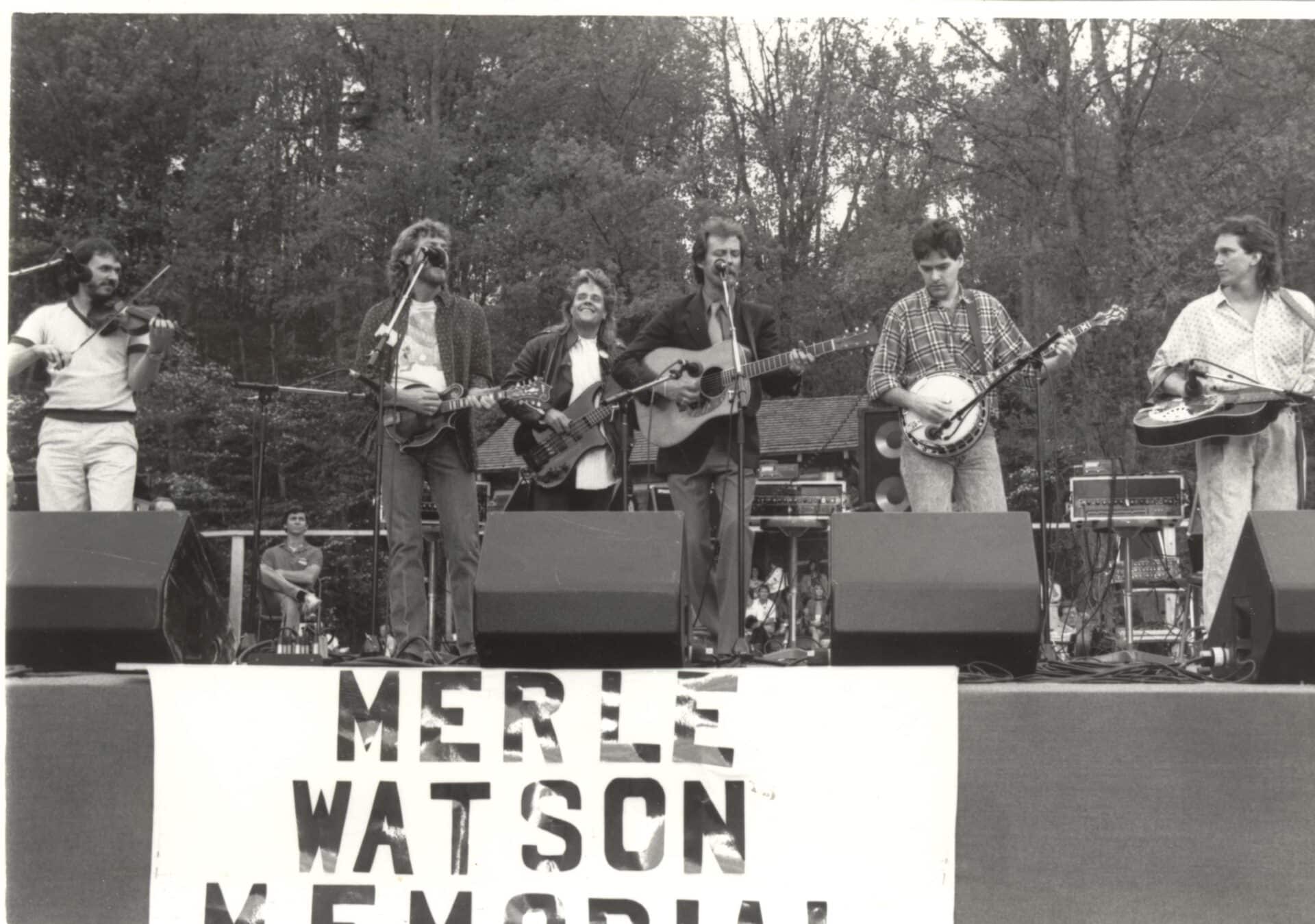
GREAT IN ’88: Mark O’Connor, from left, Sam Bush, John Cowan, Tony Rice, Bela Fleck and Jerry Douglas performed at the first MerleFest in 1988. (Courtesy venue)
Craven cited trio Nickel Creek (Chris Thile, Sara Watkins and Sean Watkins) as an example of contemporary musicians who grew up at the festival. “The entire band has been coming to the festival since they were tots,” she said. “They have a lot of history with us. So, it’s cool to see them come full circle and headlining our stages now.”
In another full-circle moment, Brown’s daughter, Hannah West, a 20-year-old junior at the prestigious Berklee College of Music, will perform with her mother. Brown toured with Watson when West was a baby and she recalled how Watson would sing ages-old ballads to her daughter backstage after a show.
“There are people I only get to see once a year and it’s at MerleFest,” Brown said. “I’ve gotten to see their kids grow up and they’ve seen my kids grow up there, because our kids have been going to MerleFest their whole lives. It’s emblematic of what’s so special about roots music, the fact that it is an intergenerational kind of music and community.”
“I think that’s a great message of what MerleFest does — and that family aspect of it — that kids can grow up there and one day be on the stages,” said Craven, who started working with MerleFest in 2018.
Craven keeps the family-friendly atmosphere in mind while booking. “The family aspect definitely informs my job quite a bit,” she said. “We have to focus on what type of performers we are bringing in and if they fit that family dynamic.”
Cox said the festival is designed to be inclusive and Craven is equally committed to showcasing diversity. The roster of performers includes Black artists Miko Marks, Dom Flemons, Yasmin Williams and the Black Opry Revue as well as a numerous female acts including Lori McKenna, Della Mae, Ali McGuirk, Donna the Buffalo, Bee Taylor, The Local Honeys, Taylor Rae, Anna Lynch and Bella White, among others.
“We pay attention to diversity in all its forms, especially getting a good female and male balance on the entire lineup, not necessarily just the main stage,” Craven explained. “There is plenty of talent to be had in every diverse faction, so we pay attention to that; that’s our job and we are putting effort there.”
With limited hotel rooms in Wilkesboro, organizers use hotels in nearby Jonesville and Boone, North Carolina, and use a transportation team to move everyone from place to place. The festival uses a huge network of 4,000 volunteers and community groups, including local Boy Scouts troops that run the shuttles and the Rotary Club, which operates the artist merchandise mall.
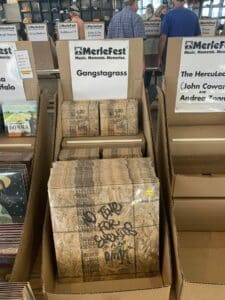
ARTISTRY: Merlefest artists, past and present, have their music for sale in the tented merchandise mall. (Don Muret/Staff)
“The college has benefited greatly, as well as the surrounding community,” Cox said. “We made an intentional decision early, instead of having all private food vendors and support structure we call on many of the local nonprofits, the Boy Scouts, Girl Scouts, church groups and school groups. They provide a lot of the services.”
The festival compensates the groups for their volunteer hours, which Is often their biggest fundraiser of the year. According to Cox, in 2022, the festival paid the nonprofits up to $500,000. The financial windfall blows across the region. Cox said the economic impact within a 75-mile radius of Wilkesboro is up to $12 million.
One of the reasons fans and artists return year after year is the unspoiled environment at Wilkes Community College.
“I think our setting is another thing that makes us unique,” Craven said. “We have a gorgeous campus and that’s something that sticks with a lot of people who have been coming to the festival for a while. What a beautiful setting it is once you get there.”
The campus setting aids fundraising as well. “Our purpose as MerleFest is to raise money for Wilkes Community College. So having it on the campus and letting people see that this is what your dollars are supporting.”
“As far as the campus itself, hundreds of thousands of dollars in scholarship monies supporting our students directly have come as a result of MerleFest,” Cox explained. “But then, if you look around the campus, all the gardens, all the buildings, in many ways this is the campus that MerleFest built. It has supported this college in a substantial way.”
Often referred to as “summer camp” by the artists, Craven said, “The fact that the artists enjoy being there so much really reflects when they are on stage because the audience knows that they are there for them. The musicians know the audience is completely present. They are there to see and appreciate the music.”
“It’s put little Wilkesboro, North Carolina, on the map,” Cox said. “I can’t think of anything the community college could have done to gain more statewide, national and international attention than hosting this festival.”
